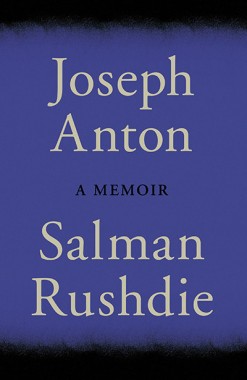 Joseph Anton. A Memoir (London, 2012) (cover left) is a memoir by Salman Rushdie.
Joseph Anton. A Memoir (London, 2012) (cover left) is a memoir by Salman Rushdie.
On Valentine’s Day, 14 February 1989, Ayatollah Ruhollah Khomeini, the Supreme Leader of Iran, issued a legal edict (a fatwa) against Rushdie on the grounds that his novel The Satanic Verses (London, 1988) blasphemed against the Prophet Muhammad. Rushdie spent several years in hiding, using the pseudonym Joseph Anton (a name he chose to honour the writers Joseph Conrad and Anton Chekhov). Joseph Anton. A Memoir is his account of his life in hiding; but it is described as a memoir rather than autobiography because it is written in the third (rather than the first) person.
In the Autumn of 1989, he was invited by the Institute of Contemporary Arts (ICA) in London to deliver the 1990 Herbert Reade Memorial Lecture. Joseph Anton takes up the story:
He knew at once that he wanted to write about iconoclasm, to say that in an open society no ideas or beliefs could be ring-fenced or given immunity from challenges of all sorts, philosophical, satirical, profound, superficial, gleeful, irreverent or smart. All liberty required was that the space for discourse itself be protected. Liberty lay in the argument itself, not in the resolution of the argument, in the ability to quarrel, even with the most cherished beliefs of others; a free society was not placid but turbulent. The bazaar of conflicting views was the place where freedom rang. [210; the lecture was published as Is Nothing Sacred? (Granta, London, 1990)].
On 22 July 1990, the British Board of Film Classification refused a certificate to International Gorillay [imdb | wikipedia], a Pakistani movie in which a debauched and villainous Rushdie is eventually struck down by thunderbolts from three Korans.Joseph Anton takes up the story:
This placed the real Rushdie in something of a quandary. He was fighting a battle for free speech and yet he was being defended, in this case, by an act of censorship. On the other hand the film was a nasty piece of work. In the end he wrote a letter to the BBFC, formally giving up his right of legal recourse, assuring the board that he would pursue neither the filmmaker nor the board itself in the courts, and that he did not wish to be accorded ‘the dubious protection of censorship’. The film should be shown so that it could be seen for the ‘distorted, incompetent piece of trash that it is’. On 17 August as a direct result of his intervention, the board unanimously voted to license the film; whereupon, in spite of all the producer’s efforts to promote it, it immediately sank without a trace, because it was a rotten film, and no matter what its intended audience may have thought about ‘Rushdie’ or even Rushdie, they were too wise to throw their money away on tickets for a dreadful film.
It was, for him, an object-lesson in the importance of the ‘better out than in’ free speech argument – that it was better to allow even the most reprehensible speech than to sweep it under the carpet, better to publicly contest and perhaps deride what was loathsome than to give it the glamour of taboo, and that, for the most part, people could be trusted to tell the good from the bad. If International Gorillay had been banned, it would have become the hottest of hot videos and in the parlours of Bradford and Whitechapel young Muslim men would have gathered behind closed curtains to rejoice in the frying of the apostate. Out in the open, subjected to the judgment of the market, it shrivelled like a vampire in sunlight, and was gone. [256]
In the light of today’s dreadful news from New York, this is my contribution to the trending twitter hashtag #RushdiesWords.